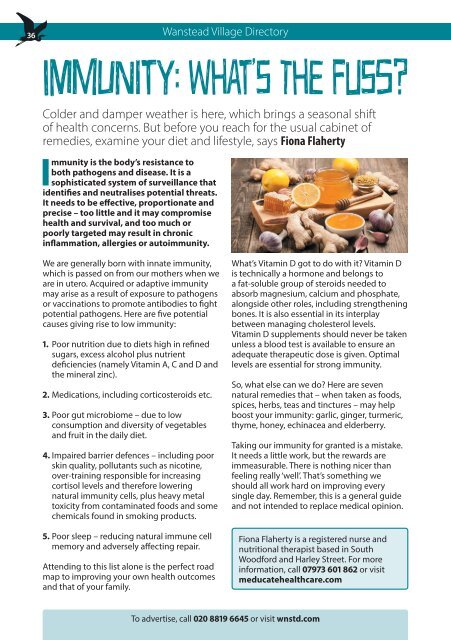November 2023
You also want an ePaper? Increase the reach of your titles
YUMPU automatically turns print PDFs into web optimized ePapers that Google loves.
36<br />
Wanstead Village Directory<br />
IMMUNITY: what’s the fuss?<br />
Colder and damper weather is here, which brings a seasonal shift<br />
of health concerns. But before you reach for the usual cabinet of<br />
remedies, examine your diet and lifestyle, says Fiona Flaherty<br />
Immunity is the body’s resistance to<br />
both pathogens and disease. It is a<br />
sophisticated system of surveillance that<br />
identifies and neutralises potential threats.<br />
It needs to be effective, proportionate and<br />
precise – too little and it may compromise<br />
health and survival, and too much or<br />
poorly targeted may result in chronic<br />
inflammation, allergies or autoimmunity.<br />
We are generally born with innate immunity,<br />
which is passed on from our mothers when we<br />
are in utero. Acquired or adaptive immunity<br />
may arise as a result of exposure to pathogens<br />
or vaccinations to promote antibodies to fight<br />
potential pathogens. Here are five potential<br />
causes giving rise to low immunity:<br />
1. Poor nutrition due to diets high in refined<br />
sugars, excess alcohol plus nutrient<br />
deficiencies (namely Vitamin A, C and D and<br />
the mineral zinc).<br />
2. Medications, including corticosteroids etc.<br />
3. Poor gut microbiome – due to low<br />
consumption and diversity of vegetables<br />
and fruit in the daily diet.<br />
4. Impaired barrier defences – including poor<br />
skin quality, pollutants such as nicotine,<br />
over-training responsible for increasing<br />
cortisol levels and therefore lowering<br />
natural immunity cells, plus heavy metal<br />
toxicity from contaminated foods and some<br />
chemicals found in smoking products.<br />
5. Poor sleep – reducing natural immune cell<br />
memory and adversely affecting repair.<br />
Attending to this list alone is the perfect road<br />
map to improving your own health outcomes<br />
and that of your family.<br />
What’s Vitamin D got to do with it? Vitamin D<br />
is technically a hormone and belongs to<br />
a fat-soluble group of steroids needed to<br />
absorb magnesium, calcium and phosphate,<br />
alongside other roles, including strengthening<br />
bones. It is also essential in its interplay<br />
between managing cholesterol levels.<br />
Vitamin D supplements should never be taken<br />
unless a blood test is available to ensure an<br />
adequate therapeutic dose is given. Optimal<br />
levels are essential for strong immunity.<br />
So, what else can we do? Here are seven<br />
natural remedies that – when taken as foods,<br />
spices, herbs, teas and tinctures – may help<br />
boost your immunity: garlic, ginger, turmeric,<br />
thyme, honey, echinacea and elderberry.<br />
Taking our immunity for granted is a mistake.<br />
It needs a little work, but the rewards are<br />
immeasurable. There is nothing nicer than<br />
feeling really ‘well’. That’s something we<br />
should all work hard on improving every<br />
single day. Remember, this is a general guide<br />
and not intended to replace medical opinion.<br />
Fiona Flaherty is a registered nurse and<br />
nutritional therapist based in South<br />
Woodford and Harley Street. For more<br />
information, call 07973 601 862 or visit<br />
meducatehealthcare.com<br />
To advertise, call 020 8819 6645 or visit wnstd.com
















